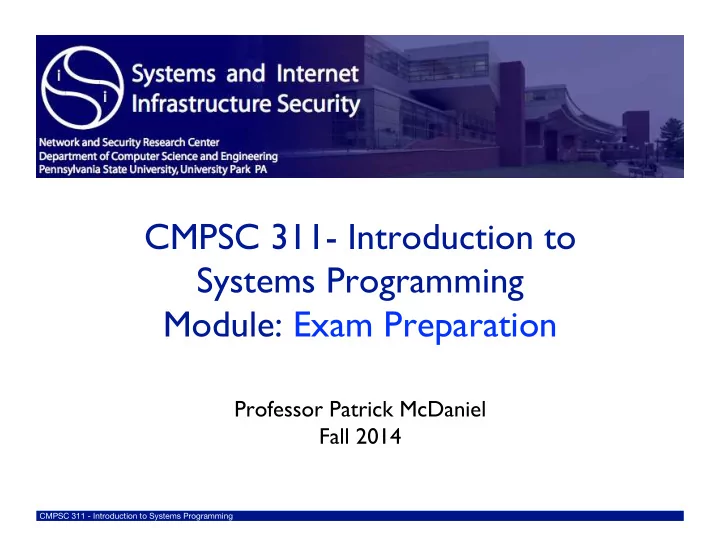

CMPSC 311- Introduction to Systems Programming Module: Exam Preparation Professor Patrick McDaniel Fall 2014 CMPSC 311 - Introduction to Systems Programming
Exams • Q: Why do we give them? • A: To make you study the material. • Implication : if you understand what the professor wants you to know (outcomes), then you know what will be on the test. CMPSC 311 - Introduction to Systems Programming Page
311 Outcomes? • Terminology: abstractions, application space, … • Concepts: isolation, caching, … • Language primitives: addresses, strings, structs, … • Interfaces: file I/O, memory management, … • Tools: compiler, debugger, linker, … • Skills: calculating address, coding with strings, … CMPSC 311 - Introduction to Systems Programming Page
What do I ask in exams? • Terminological/definition questions (8 questions) ‣ Asks: what are the terms and ideas (most regurgitate)? ‣ Form: short answer (1-2 sentences, sometime a single word) ‣ Weight: about 40% CMPSC 311 - Introduction to Systems Programming Page
What do I ask in exams? • Conceptual synthesis (2 questions) ‣ Asks: explain the course concepts and apply them? ‣ Form: long answer (1-2 paragraphs) ‣ Weight: about 20% CMPSC 311 - Introduction to Systems Programming Page
What do I ask in exams? • Skills demonstration (4 questions) ‣ Asks: show mastery of skills taught in class and assignments? ‣ Form: word problems ‣ Weight: about 40% CMPSC 311 - Introduction to Systems Programming Page
How to study? • Focus energy on the slides and course assignments. • Book is there for additional information, there may be a short question about content. • You should be able to perform any skill taught in class. CMPSC 311 - Introduction to Systems Programming Page
How to take? • Read the questions very carefully. • Answer what you know first. • Only try to figure out how to perform an unknown skill after you have done everything else. CMPSC 311 - Introduction to Systems Programming Page
Getting Meta … • Studying is the act of … ‣ (a) preparing your mind to accept new information and connections, ‣ (b) consuming the data ‣ (c) retaining it • To be effective, you have to address these three things or you won’t do it well … CMPSC 311 - Introduction to Systems Programming Page
Preparing your mind … • Our brains work best when fresh and free of distractions … the implication being … ‣ Study when your body is ready (morning or night) ‣ Study where you are comfortable (library, your favorite chair) and minimal distractions (soft music, no TV, ..) ‣ Study in bursts (procrastination is death), take breaks to sustain productivity (5 minutes tops) CMPSC 311 - Introduction to Systems Programming Page
Consuming the data … • Out brains are really large pattern recognition machines that crave structure … • How you organize the information you collect when studying is critical ‣ The list method ‣ The diagram method ‣ The sentence method ‣ The annotation method ‣ The highlighter method • They vary in effectiveness-how well the material translates to a model in your head? CMPSC 311 - Introduction to Systems Programming Page
Retaining the data … • The key to long term memory (and thus education) is fostering connections and ensuring repetition • Committing to connections ‣ This is where the output consuming part is … it should reflect a lattice of ideas and connections (diagrams, ..) ‣ Study the connections between concepts … ‣ Memory degrades quickly (exponentially) … • Repetition ‣ Brains need repetition to garner mastery ‣ Procrastination/cramming prevents mastery CMPSC 311 - Introduction to Systems Programming Page
How about some freebee questions? CMPSC 311 - Introduction to Systems Programming Page
How about some freebee questions? CMPSC 311 - Introduction to Systems Programming Page
Recommend
More recommend